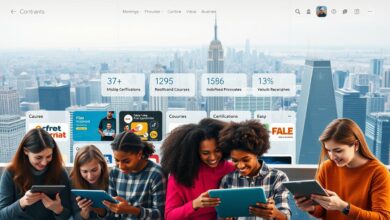How to Access Elite University Content Without Paying Tuition
Getting access to top university content without paying tuition is now easier, especially for students in Nigeria who can’t afford it. The digital world has lots of academic resources. These help students learn from famous universities without spending money.
Anúncios
Students can use online platforms to find educational articles and materials from top universities. This way, they can improve their studies and learn more without facing usual education barriers. This approach makes learning more accessible and prepares students for the job market, helping them grow personally and professionally.
Understanding Elite University Content
Elite University Content is top-notch educational material from famous schools. It’s key for a better learning experience. It gives students access to valuable resources that help them learn more.
Definition and Importance in Education
Elite University Content is important because it offers deep academic resources. Students get to learn from experts, see the latest research, and try new teaching methods. This helps them think critically and understand things better.
Types of Content Offered
There are many types of Elite University Content, including:
- Lectures and course materials
- Research papers and publications
- Online workshops and seminars
- Interactive quizzes and assessments
These formats give students a full learning experience. They are key for those wanting to learn more.
Relevance to Nigerian Students
Nigerian students can greatly benefit from Elite University Content. Many struggle because of money issues. But, with the right resources, they can meet global learning standards. This helps them close knowledge gaps and get better jobs.
Benefits of Accessing University Materials
Getting access to university materials brings many benefits. It helps students learn more deeply and gain skills for their future jobs. This section will talk about better learning, skill growth, and networking through academic resources.
Enhanced Learning Experience
University content goes beyond what you find in textbooks. It includes videos, simulations, and detailed course materials. This variety makes studying more fun and helps you remember what you learn.
University content is also designed for different learning styles. This makes studying more effective for everyone.
Opportunities for Skill Development
University materials teach important skills in many areas. Courses focus on practical uses and real-life examples. Students learn to think critically, solve problems, and analyze information.
These skills are key for moving up in your career. They help you stand out in a competitive job market.
Networking and Community Building
Using academic resources also helps you meet new people. You can talk to classmates, teachers, and industry experts. This is through forums, groups, and projects.
These connections are great for your future. They help you grow and make your education richer.
Free Online Course Platforms Available
Free online courses open doors for Nigerian students to learn more without spending money. MOOCs offer a wide range of subjects. Sites like Coursera, edX, and FutureLearn have courses for today’s learners. They also help improve learning by optimizing university websites.
Exploring MOOCs: Coursera, edX, and FutureLearn
Coursera, edX, and FutureLearn lead in digital learning. Coursera works with top universities worldwide, covering many subjects. edX, started by Harvard and MIT, offers high-quality courses. FutureLearn connects learners with UK institutions, offering interesting courses.
Each platform has its own special features. They meet different learning styles.
Niche Platforms for Specialized Fields
Specialized platforms offer courses for specific careers or interests. DataCamp focuses on data science, and Codecademy teaches programming. These sites help students learn new skills for their careers.
Writing for higher education is key in these programs. It ensures learners get quality content for their field.
Comparison of Course Offerings
| Platform | Course Type | Duration | Certification |
|---|---|---|---|
| Coursera | Comprehensive subjects | 4-12 weeks | Yes |
| edX | University-level courses | 6-10 weeks | Yes |
| FutureLearn | Short courses | 2-6 weeks | Optional |
| DataCamp | Data science | Per course | No |
| Codecademy | Programming | Varies | Yes |
This table shows the many paths students can take. With so many free courses, learners can find the best fit for their needs. They can also use website optimization to enhance their learning.
Leveraging Open Educational Resources (OER)
Open Educational Resources (OER) are a big step forward in making learning materials more accessible. They include content that is open for anyone to use, helping everyone learn without worrying about money. Knowing where to find OER can help students in Nigeria get access to expensive university materials.
What Are Open Educational Resources?
OER are materials like textbooks, courses, and videos that are free and online. They help remove the cost barriers of traditional learning. This way, everyone can learn more and understand better. OER can be adjusted to fit different learning needs, making education more inclusive and personal.
Examples of OER Platforms
Many platforms offer Open Educational Resources, making knowledge more accessible. Some key ones are:
- OER Commons: A big library where you can find and share educational stuff.
- OpenStax: Offers free, high-quality textbooks for college-level studies.
- MERLOT: A collection of free teaching and learning materials, mainly for college.
Educational Impact in Nigeria
In Nigeria, using Open Educational Resources is key to closing learning gaps. Studies show it helps students who can’t afford books learn better. By adding OER to school programs, schools offer more learning options and make education fairer. This approach helps students learn on their own, making it easier to get to university materials.
| Platform | Description | Focus Area |
|---|---|---|
| OER Commons | Repository for shared educational materials | General Education |
| OpenStax | Free peer-reviewed textbooks | Higher Education |
| MERLOT | Curation of free teaching materials | Higher Education |
Using University Libraries and Archives
University libraries and archives are key for students looking for academic resources. They have a lot of information, helping students understand different subjects better. Digital libraries make these resources easy to find, especially for students in Nigeria who might not have access to physical libraries.
Accessing Digital Libraries
Many universities have digital libraries with lots of books, articles, and more. Students can use these from anywhere, which is great for those studying online. Digital libraries help with writing for college by offering a wide range of literature, making it easy to find credible sources.
Open Access Journals and Research Papers
Open access journals make knowledge available to everyone. They let users read top research papers for free. This is good for students who can’t afford to buy expensive journals. Using these resources helps students understand complex topics better and improves their academic skills.
Interactions with Universities Globally
Working with universities around the world opens up new learning opportunities. With digital libraries and open access, students can connect with scholars worldwide. This enriches their education, giving them different views and practical uses for their studies.
Engaging with Online Forums and Study Groups
Online forums and study groups have changed how we learn. They let students connect, share knowledge, and learn together. These places are great for networking with peers and experts.
Platforms like Reddit and Quora are full of lively discussions. They help students understand and remember tough subjects better.
Popular Platforms for Discussion
Reddit and Quora lead in academic talks. They have special areas for different subjects. Users can ask questions, share resources, and have deep conversations.
Other forums like Stack Exchange focus on specific areas. They help students have focused discussions in their interests.
Benefits of Collaborative Learning
Learning together has many benefits. It helps students understand ideas better by sharing thoughts. It also opens doors for future career chances.
Students often say that learning together makes hard topics clearer. It makes studying more fun and easy.
Case Studies of Successful Study Groups
Many study groups have shown how teamwork boosts grades. Groups focused on certain subjects have seen better grades and retention. These examples show how working together creates a great learning space.
Students in these groups do well academically. They learn a lot from each other and grow together.
Following Notable University Blogs and Websites
University blogs and websites offer a wealth of knowledge and new trends in education. By following these, students gain a deeper understanding of the academic world. They also get insights into various fields and access valuable articles for their studies and careers.
Identifying Influential University Bloggers
To explore college content creation, students should find influential university bloggers. These bloggers share valuable perspectives and knowledge. Look for:
- Experts in specific academic fields.
- Bloggers who post regularly.
- Those who engage with their audience.
- Presence on social media.
Benefits of Staying Updated
Staying current with university blogs has many benefits. Students get to see different viewpoints and new ideas. They also get:
- News and updates on educational policies.
- Info on upcoming events and webinars.
- Details on research and academic pursuits.
How to Curate Relevant Content
Curating content from university blogs helps tailor learning to personal interests. Useful strategies include:
- Picking blogs that match academic goals.
- Subscribing to newsletters for new posts.
- Using RSS feeds to gather articles.
Utilizing Social Media for Academic Growth
Social media is now a key tool for finding academic resources and boosting education marketing. Students can find lots of educational content on these platforms. It helps them discover new information and connect with others in their field.
Platforms to Follow for Educational Content
Many platforms offer educational content to help students grow. Here are some to consider:
- Twitter – A place where academics share insights and studies.
- LinkedIn – Great for networking with professionals and experts.
- Instagram – Shows educational infographics and short tutorials in a fun way.
- YouTube – Has lectures, discussions, and educational videos from top universities.
Creating an Academic Network
Building a strong academic network on social media is very beneficial. It lets students work together and share ideas. By joining groups and following organizations, students stay updated on trends and opportunities.
Engaging with University Content Creators
Connecting with university content creators gives students a peek into new academic discoveries. They can follow professors, researchers, and university departments. This way, students can join discussions and learn more about university content.
Attending Free Online Lectures and Webinars
Free online lectures and webinars from universities are a great chance for students to learn. They offer insights from experts on various topics. Students can find live events that match their interests on different platforms.
Finding Live Events at Universities
Many universities have live online lectures and webinars. You can check their websites and event calendars for upcoming events. Sites like Eventbrite and Meetup also list educational webinars. Following universities on social media helps you stay updated.
Benefits of Interactive Learning
Live events make learning more engaging. Students can ask questions and have discussions in real-time. This helps them understand topics better.
Meeting peers and professionals during these events is also valuable. It adds to the learning experience by promoting teamwork and community.
Recording and Archiving for Future Reference
Many online lectures and webinars can be recorded. This lets students review them later. Keeping these recordings helps in studying and understanding the material better.
Using digital tools like Google Drive to store these recordings is helpful. It keeps all your academic resources organized and easy to find.
Exploring Government and NGO Initiatives
In Nigeria, the government and NGOs are key in improving education. They offer programs to help students learn online. These efforts aim to close the education gap.
Educational Programs Supporting Nigerian Students
Many programs have been set up for Nigerian students. They provide resources and content to improve learning. Some notable ones include:
- National Open University of Nigeria (NOUN) initiatives
- Partnerships with global educational organizations
- Local government-funded scholarships aimed at reducing educational costs
Scholarships and Grants for Online Learning
Scholarships and grants help with the cost of online learning. Organizations, from the government to non-profits, offer these. Here are a few examples:
| Program Name | Provider | Eligibility Criteria | Amount Awarded |
|---|---|---|---|
| MTN Foundation Scholarship | MTN Nigeria | Undergraduate students in STEM fields | $1,000 |
| Federal Government Scholarship | Federal Ministry of Education | Meritorious Nigerian students | $1,500 |
| NOC Scholarships | Nigerian Oil Corporation | Students in energy-related disciplines | $2,000 |
Building Community Partnerships
Building a strong community is vital for learning. NGOs work with local communities to offer more resources. This leads to:
- Community-driven educational workshops
- Access to mentorship programs
- Shared resources and study groups for enhanced learning
Understanding the Role of YouTube and Educational Videos
YouTube has become a key place for finding top-notch university content. Teachers and schools use it to share learning materials with students all over the world, including Nigeria. It’s filled with channels for different subjects, helping students with their studies.
Channels Dedicated to University-Level Content
Many YouTube channels offer detailed courses and lectures that help students learn more. Channels like Coursera, Khan Academy, and MIT OpenCourseWare are great examples. They have playlists for various subjects, making it easier for students to understand complex ideas.
Types of Videos Beneficial for Students
YouTube has many educational videos for university students. These include:
- Lecture recordings from top universities that cover important topics.
- Tutorials that make hard subjects easier, especially in STEM fields.
- Discussion panels that show how theoretical knowledge is used in real life.
Best Practices for Effective Learning
To get the most out of educational videos, students should follow these tips:
- Have clear learning goals to focus on important topics.
- Take notes during lectures to remember more.
- Interact with the content by asking questions and looking for answers in comments or extra resources.
Planning a Self-Directed Learning Pathway
Creating a self-directed learning pathway lets people control their education. They can set goals and plan how to learn new skills. This is especially helpful for students in Nigeria who want to improve their studies and career goals.
Setting Educational Goals
Starting this journey means setting clear, achievable goals. These goals should be specific, measurable, and time-bound. This helps stay focused and motivated.
Knowing what you’re interested in and your career goals is key. It helps choose the right resources and articles to learn from.
Resources to Create a Personalized Curriculum
Many platforms offer tools for creating a customized curriculum. Open educational resources, MOOCs, and online libraries are full of useful information. By using these resources, learners can make a study plan that fits their interests and career goals.
FAQ
What is elite university content?
How can Nigerian students access elite university content for free?
What are some benefits of accessing university materials?
Which free online course platforms are recommended?
What are Open Educational Resources (OER)?
How do university libraries assist in accessing educational materials?
What are the benefits of engaging with online forums and study groups?
Why is it important to follow university blogs and websites?
How can social media be used for academic advancement?
What should students know about attending free online lectures and webinars?
What government and NGO initiatives support education for Nigerian students?
How can YouTube benefit students seeking academic content?
What steps should be taken to create a self-directed learning pathway?
Published on: 11 de April de 2025

Arturo González
Arturo González is the founder and lead writer of DebxCred.com, a platform created to help people make smarter and more informed financial decisions. With a degree in Business Administration and a specialization in Financial Marketing, Arturo built a solid corporate background before deciding to share his knowledge in a practical, easy-to-understand way.
Driven by a genuine passion for finance and education, Arturo turned DebxCred.com into a trusted source for detailed reviews of financial products, digital banking tools, and practical financial education — empowering readers to take control of their money with confidence.
In his free time, Arturo finds balance and inspiration while surfing — a hobby that reflects his calm yet determined approach to helping others build a healthier and more prosperous financial life.



